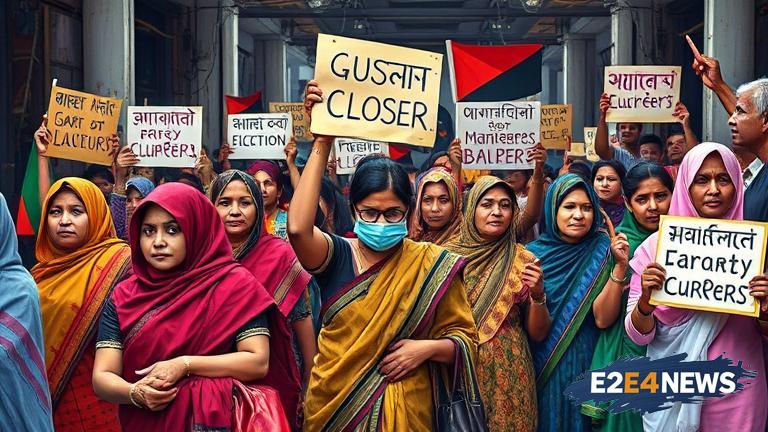The sudden closure of a garment factory in Dhamrai, Bangladesh, has sparked protests among hundreds of workers who were left without jobs or compensation. The factory, which was one of the largest in the area, employed over 1,000 workers who were mostly women. The workers claimed that they were not given any notice or warning before the factory was closed, and they were not paid their due wages or benefits. The protesters blocked the Dhaka-Aricha highway, causing traffic congestion and disrupting the daily activities of the local residents. The workers demanded that the factory owners reopen the factory and pay them their due wages and benefits. They also demanded that the government take action against the factory owners for violating labor laws. The protest continued for several hours, with the workers chanting slogans and holding banners. The local police tried to disperse the crowd, but the workers refused to leave until their demands were met. The incident has highlighted the plight of garment workers in Bangladesh, who often face exploitation and abuse at the hands of factory owners. The garment industry is one of the largest employers in Bangladesh, with millions of workers employed in thousands of factories across the country. However, the industry has been plagued by problems such as low wages, poor working conditions, and lack of job security. The government has promised to take action to improve the working conditions and protect the rights of garment workers, but much remains to be done. The protesters in Dhamrai have vowed to continue their protest until their demands are met, and they have called on the government to take immediate action to address their grievances. The incident has also sparked concerns about the impact of the factory closure on the local economy, as the factory was one of the largest employers in the area. The local residents have expressed their support for the protesting workers, and they have called on the government to take action to protect the rights of the workers. The protest has also highlighted the need for greater transparency and accountability in the garment industry, as well as the need for stronger labor laws to protect the rights of workers. The government has announced an investigation into the factory closure, and they have promised to take action against the factory owners if they are found to have violated labor laws. The protesters have welcomed the government’s announcement, but they have vowed to continue their protest until their demands are met. The incident has sparked widespread condemnation from labor rights groups and activists, who have called on the government to take immediate action to address the grievances of the workers. The protesters have also called on international brands and retailers to take responsibility for the working conditions in their supply chains, and to ensure that their suppliers are complying with labor laws and regulations. The incident has highlighted the need for greater cooperation and coordination between the government, factory owners, and labor rights groups to protect the rights of garment workers and to promote fair labor practices in the industry. The protesters have vowed to continue their fight for justice and fairness, and they have called on the government and factory owners to take immediate action to address their grievances.
